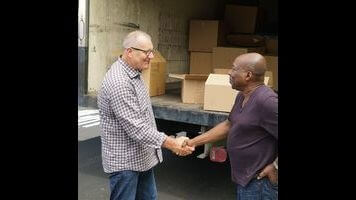Last week’s episode failed miserably when it decided to pull out every Latin-American stereotype you can imagine, but this week’s installment, “A Stereotypical Day”—being in on the “joke” isn’t a good look either, Modern Family—is perhaps even more misguided. The various subplots begin harmlessly enough, with the Dunphy kids reminiscing about their summer vacations—Hayley is apparently over Andy, and Alex is failing to come back from a bad case of Mono—and Phil getting stuck in a pantry during an open house, which is perfect occasion for some of Ty Burrell’s great physical comedy and sense of timing. Then, things take a turn for the worse, as “A Stereotypical Day” shifts gears, unsuccessfully musing on issues facing the transgender community, PTSD, and race relations in America.
To be fair, Modern Family isn’t exactly looking to say anything insightful about those topics, so to hold it to some sort of political standard would be foolish. But at the same time, there’s a certain amount of responsibility that comes with trotting out hot-button topics that have a meaningful place in the cultural conversation. It’s too easy for a sitcome, or any show really, to use those topics for empty or even harmful laughs, meaning that to shrug off Modern Family’s nonchalant approach to these stories with “well, it’s just a sitcom,” isn’t exactly fair. The show is responsible for its message, especially when it purports to be so inclusive and progressive.
So, as great as it is that “A Stereotypical Day” features a young transgender actor, it doesn’t make up for the fact that the episode itself is littered with stereotypes. This isn’t satire, nor is it the show pointing out the ignorance of some of its characters. Rather, it’s the show leaning into tired depictions of race and gender for laughs. But, like last week’s disaster in Mexico, it’s hard to find the punchline. Take Jay’s main storyline this week. On the same day that he’s having security cameras installed outside his home, a black family is moving in across the road. That sends Jay into a panic, as he doesn’t want his new neighbors to think he’s some crazy, old racist. Or, as Jay puts it to a confused (and exceedingly patient) Gloria, “you’ll never understand the stereotypes old white men face.”
As the storyline progresses and intertwines with Cam and Mitchell’s worry that Lily isn’t treating her new transgender friend Tom with respect and an open mind, there’s the potential for some intriguing nuance. There are moments where the characters actually reckon with their own prejudices and the lies that we tell ourselves about our own enlightened behavior. It’s there in the moment when Cam and Mitchell wonder if they’re more like Jay than they want to admit, and in Jay’s insight that sometimes it takes time for people to adjust to new truths. Those are interesting, complex character moments that dig a little deeper into who these people are and how they understand themselves.
Those moments never last though, and it isn’t long before “A Stereotypical Day” is back to treating important issues as fodder for jokes. There’s the running gag of Phil suffering from “PTSD” after he was locked in the pantry, even going so far as to treat Alex like a therapy dog. In a week where You’re The Worst showed off just how to tackle PTSD in a serious but still touching and funny manner, Modern Family’s approach feels particularly hollow. But the problem with the episode isn’t just that it’s not as scathing as the material necessitates, but rather that the storylines themselves do nothing to actually subvert or overcome the stereotypes being peddled. In essence, “A Stereotypical Day” carries itself like a bit of satire that exposes the flaws in painting anyone with too broad a brushstroke, and yet it ends up enforcing the exact stereotypes it hopes to challenge.
Stray observations
- Jay’s storyline leads to a “payoff” that involves him confusing his neighbor saying “by the way” with the pronunciation of “a beautiful African name.” Just, no, Modern Family.
- Manny, going through some weird communism phase in order to impress a girl: “I see, fill my mouth with bougie opiates so I can’t speak for the people.” Cam: “That was a lot.”
- “How do you ask a human not to go again?”
- “Why do you look so satisfied? Did you just listen to an NPR story that proved you right about something?” Again, there are hints of the show dealing with self-perception when it comes to social issues, but it never goes beyond barely scratching the surface.
- “It was actually illegal to run for Mayor without a moustache until 1980. Then again from ‘82 to ‘85.”


 Keep scrolling for more great stories from A.V. Club.
Keep scrolling for more great stories from A.V. Club.